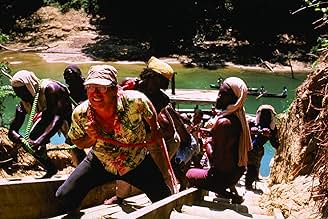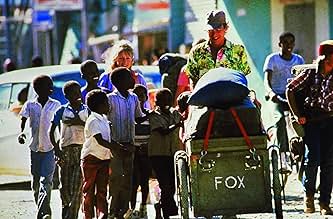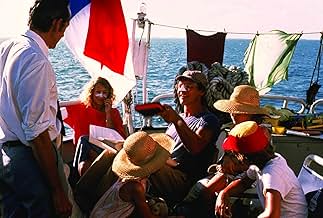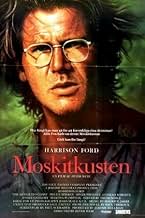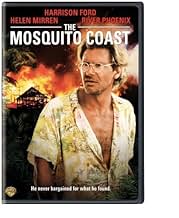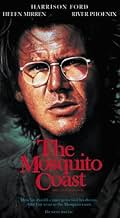Un inventore rifugge dalla vita di città e trasferisce la famiglia nelle giungle dell'America centrale per realizzare un'utopia.Un inventore rifugge dalla vita di città e trasferisce la famiglia nelle giungle dell'America centrale per realizzare un'utopia.Un inventore rifugge dalla vita di città e trasferisce la famiglia nelle giungle dell'America centrale per realizzare un'utopia.
- Premi
- 1 vittoria e 3 candidature totali
Alice Heffernan-Sneed
- Mrs. Polski
- (as Alice Sneed)
Recensioni in evidenza
Who hasn't wondered, considered, or fantasized about leaving this whole rat race beyond and go off somewhere remote to just do your own thing? I know I have and sometimes still do. Well, the main character here, play by Ford, does just that, and he brings his entire family along with him. Despite his good intentions they are all met with considerable obstacles and challenges throughout. There were times that I felt for his character, but even more so for his wife and kids being reluctantly pulled and pushed along on his obsession. There are definitely some issues with this film, one being a lack of clarity in its message, but I still think it is worth checking out.
The Mosquito Coast is an odd film. It attempts to talk about issues which are important and which few films address, fails to communicate them clearly, yet isn't sucked into the maelstrom of moralizing and sententiousness that films like this almost inevitably enter. Instead, it occupies some sort of odd middle ground of ambiguity and murkiness. One gets the feeling that the film is a lot like the Fox family: they know they're going upstream but they have no specific destination, and some of them really aren't sure why they're going there in the first place.
I felt from the very beginning that the film failed to define its ideals or set a sense of clear direction. Harrison Ford, in a performance which I found unconvincing (perhaps because of the inability of the film to articulate what motivated him), rambles on about everything from the Japanese to nuclear war. There's a large difference between subtlety, i.e. not spelling things out for the viewer, and incoherence. This was incoherent. We know that he's unhappy with America, but I don't know what he's really looking for, what motivates him, etc.. Maybe he doesn't know. But if that's the case, it should be made clear.
A good example of how this plays out is his attempt to bring ice to the "noble savages." Why does he do this? Because "ice is civilization." But why does he want to bring them civilization? It seemed to me that civilization was something he was having a lot of problems with. I assume that the novel explained this more clearly and the film failed to translate properly. He of course stated earlier in the film that the savages would probably think ice a sort of jewel. So? Why does this matter? Is he looking for lost innocence?
Then later in the film "Mother" says she wishes to go to Mr. Haddy's place. He responds "And live like savages?" I can only assume that he wishes to establish some sort of elementary civilization where a small community lives in peace and harmony. Or perhaps he's just looking to withdraw from everyone, as his spurning of Mr. Haddy's gifts would show. Also, a possible literary reference is the name of their craft, Victory, which is the name of a very dull Joseph Conrad novel about a man who withdraws from life and goes to live on an island. Extreme misanthropy? Unlikely.
A possible light at the end is his talk about man not being made to walk upright. Is he looking for some sort of return to primal existence? But then why invent air conditioning in Geronimo? It all adds up to a very disorganized mess, both in Mr. Fox's head, and on screen. The Mosquito Coast is like a puzzle that still has all the pieces, but rather than fit them together, Weir just threw them all in the box and let us look at them.
I felt from the very beginning that the film failed to define its ideals or set a sense of clear direction. Harrison Ford, in a performance which I found unconvincing (perhaps because of the inability of the film to articulate what motivated him), rambles on about everything from the Japanese to nuclear war. There's a large difference between subtlety, i.e. not spelling things out for the viewer, and incoherence. This was incoherent. We know that he's unhappy with America, but I don't know what he's really looking for, what motivates him, etc.. Maybe he doesn't know. But if that's the case, it should be made clear.
A good example of how this plays out is his attempt to bring ice to the "noble savages." Why does he do this? Because "ice is civilization." But why does he want to bring them civilization? It seemed to me that civilization was something he was having a lot of problems with. I assume that the novel explained this more clearly and the film failed to translate properly. He of course stated earlier in the film that the savages would probably think ice a sort of jewel. So? Why does this matter? Is he looking for lost innocence?
Then later in the film "Mother" says she wishes to go to Mr. Haddy's place. He responds "And live like savages?" I can only assume that he wishes to establish some sort of elementary civilization where a small community lives in peace and harmony. Or perhaps he's just looking to withdraw from everyone, as his spurning of Mr. Haddy's gifts would show. Also, a possible literary reference is the name of their craft, Victory, which is the name of a very dull Joseph Conrad novel about a man who withdraws from life and goes to live on an island. Extreme misanthropy? Unlikely.
A possible light at the end is his talk about man not being made to walk upright. Is he looking for some sort of return to primal existence? But then why invent air conditioning in Geronimo? It all adds up to a very disorganized mess, both in Mr. Fox's head, and on screen. The Mosquito Coast is like a puzzle that still has all the pieces, but rather than fit them together, Weir just threw them all in the box and let us look at them.
Some of the other reviews summarize this pretty well. The Mosquito Coast details flawlessly the grotesque decomposition of a good and true man. Harrison Ford's Allie is driven insane by his own intelligence and inability to control his ego. Even more remarkable and disquieting is the fact that this is based on a true story. In some ways, Allie reminds me of Dr. Mobius from Forbidden Planet. But the demons Allie conjures up are far more grotesque and deadly than anything from even Mobius' warped imagination. I conclude that this is a true piece of art and science -- magnificently crafted from beginning to end -- and I will NEVER voluntarily watch it again.
The Mosquito Coast is a movie that has many things going for it, but fails to combine all its excellent ingredients in a way that makes it feel great. I think there's still a good deal to like, but overall, it feels a bit unsatisfying and disappointing.
You have an interesting premise, with a deranged father leading his family to live in the wilderness. You have Harrison Ford playing one of the most villainous characters he's ever played (maybe the most villainous?) You have a great supporting cast with people like Helen Mirren and River Phoenix. You've got a fantastic composer in Maurice Jarre. And then there's Peter Weird directing, who's made several classics, often involving themes of isolation or "adventures" that go wrong or people getting by in unfamiliar situations.
At the end... it's fine? It never really hits that point where it becomes something else, though. Maybe it's Ford's character- while I found it a breath of fresh air for the protagonist to have few, if any, redeeming qualities, maybe that hurt my engagement with the film in the long run.
Anyway, good premise, good acting, good music, and the the way it's shot is solid, too. Maybe it just needed a tighter script to keep things more interesting, or at least more consistent. It does feel poorly adapted into a movie, screenplay-wise. You can tell these lines are from a novel, with much of the dialogue sounding like they're just reading off a page.
You have an interesting premise, with a deranged father leading his family to live in the wilderness. You have Harrison Ford playing one of the most villainous characters he's ever played (maybe the most villainous?) You have a great supporting cast with people like Helen Mirren and River Phoenix. You've got a fantastic composer in Maurice Jarre. And then there's Peter Weird directing, who's made several classics, often involving themes of isolation or "adventures" that go wrong or people getting by in unfamiliar situations.
At the end... it's fine? It never really hits that point where it becomes something else, though. Maybe it's Ford's character- while I found it a breath of fresh air for the protagonist to have few, if any, redeeming qualities, maybe that hurt my engagement with the film in the long run.
Anyway, good premise, good acting, good music, and the the way it's shot is solid, too. Maybe it just needed a tighter script to keep things more interesting, or at least more consistent. It does feel poorly adapted into a movie, screenplay-wise. You can tell these lines are from a novel, with much of the dialogue sounding like they're just reading off a page.
Harrison Ford is often described as a movie star rather than an actor, but "The Mosquito Coast" easily disproves that (actually, so does "Blade Runner", but I digress). It's a fevered performance on which the whole film rests. Easily worth a watch.
But it also demands a lot from the audience. For one, there's an undercurrent of dread that's there right from the start and it's hard to watch Ford's mercurial character drag his family to the far ends of the jungle essentially to reboot civilization (a myopic one, at that). All I could think of was my family in that situation (hell, no).
I'm not going to lie, this is a hard movie, rife with misfortune; on occasions shocking, infuriating and exhausting. But I was glued to my seat until the very end, primarily because of Ford's deteriorating mental state. That's a house of horrors unto itself. This is a well-directed movie but man if it's not wearing.
But it also demands a lot from the audience. For one, there's an undercurrent of dread that's there right from the start and it's hard to watch Ford's mercurial character drag his family to the far ends of the jungle essentially to reboot civilization (a myopic one, at that). All I could think of was my family in that situation (hell, no).
I'm not going to lie, this is a hard movie, rife with misfortune; on occasions shocking, infuriating and exhausting. But I was glued to my seat until the very end, primarily because of Ford's deteriorating mental state. That's a house of horrors unto itself. This is a well-directed movie but man if it's not wearing.
The Life and Times of Harrison Ford
The Life and Times of Harrison Ford
Take a look back at Harrison Ford's movie career in photos.
Lo sapevi?
- QuizWhile building the town set in Belize, the crew unearthed an ancient Mayan temple. It notified the Belize government, which declared the site an important historical find.
- BlooperThe "Ice from Fire" technique for using heat, ammonia and hydrogen was actually invented in 1824 by the English scientist Michael Faraday.
- Citazioni
Emily Spellgood: [to Charlie] I think about you when I go to the bathroom.
- Colonne sonoreClap Your Hands
Words and Music by Gary Johnson
Performed by Grace Gospel Primary School Choir
I più visti
Accedi per valutare e creare un elenco di titoli salvati per ottenere consigli personalizzati
- How long is The Mosquito Coast?Powered by Alexa
Dettagli
Botteghino
- Budget
- 25.000.000 USD (previsto)
- Lordo Stati Uniti e Canada
- 14.302.779 USD
- Fine settimana di apertura Stati Uniti e Canada
- 110.313 USD
- 30 nov 1986
- Lordo in tutto il mondo
- 14.302.779 USD
- Tempo di esecuzione
- 1h 57min(117 min)
- Colore
- Mix di suoni
- Proporzioni
- 1.85 : 1
Contribuisci a questa pagina
Suggerisci una modifica o aggiungi i contenuti mancanti




